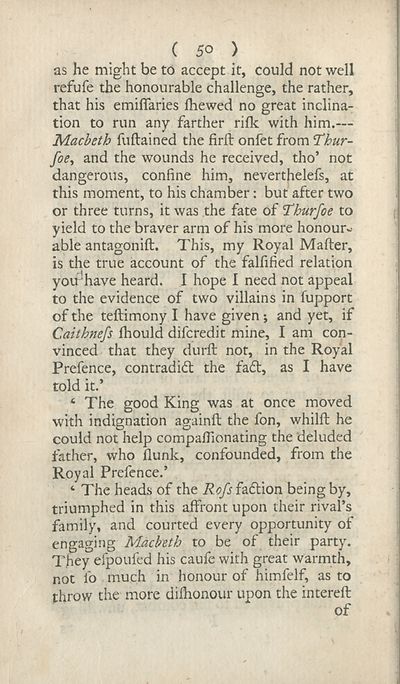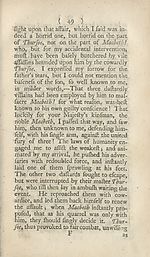Download files
Complete book:
Individual page:
Thumbnail gallery: Grid view | List view

( 5° )
as he might be to accept it, could not well
refufe the honourable challenge, the rather,
that his emiffaries Ihewed no great inclina¬
tion to run any farther rifle with him.—
Macbeth fuftained the firft onfet from 'Thur-
foe, and the wounds he received, tho’ not
dangerous, confine him, neverthelefs, at
this moment, to his chamber: but after two
or three turns, it was the fate of Thurfoe to
yield to the braver arm of his more honour¬
able antagonift. This, my Royal Mafter,
is the true account of the falfified relation
yoif!have heard. I hope I need not appeal
to the evidence of two villains in fupport
of the teftimony I have given; and yet, if
Caithnefs fhould diferedit mine, I am con¬
vinced that they durft not, in the Royal
Prefence, contradid the fad, as I have
told it.’
‘The good King was at once moved
with indignation againft the fon, whilfl he
could not help compaflionating the deluded
father, who flunk, confounded, from the
Royal Prefence.’
‘ The heads of the Rofs fadion being by,
triumphed in this affront upon their rival’s
family, and courted every opportunity of
engaging Macbeth to be of their party.
They efpoufed his caufe with great warmth,
not fo much in honour of himfelf, as to
throw the more difhonour upon the intereft
as he might be to accept it, could not well
refufe the honourable challenge, the rather,
that his emiffaries Ihewed no great inclina¬
tion to run any farther rifle with him.—
Macbeth fuftained the firft onfet from 'Thur-
foe, and the wounds he received, tho’ not
dangerous, confine him, neverthelefs, at
this moment, to his chamber: but after two
or three turns, it was the fate of Thurfoe to
yield to the braver arm of his more honour¬
able antagonift. This, my Royal Mafter,
is the true account of the falfified relation
yoif!have heard. I hope I need not appeal
to the evidence of two villains in fupport
of the teftimony I have given; and yet, if
Caithnefs fhould diferedit mine, I am con¬
vinced that they durft not, in the Royal
Prefence, contradid the fad, as I have
told it.’
‘The good King was at once moved
with indignation againft the fon, whilfl he
could not help compaflionating the deluded
father, who flunk, confounded, from the
Royal Prefence.’
‘ The heads of the Rofs fadion being by,
triumphed in this affront upon their rival’s
family, and courted every opportunity of
engaging Macbeth to be of their party.
They efpoufed his caufe with great warmth,
not fo much in honour of himfelf, as to
throw the more difhonour upon the intereft
Set display mode to:
![]() Universal Viewer |
Universal Viewer | ![]() Mirador |
Large image | Transcription
Mirador |
Large image | Transcription
| Antiquarian books of Scotland > Languages & literature > Key to the drama > (72) |
|---|
| Permanent URL | https://digital.nls.uk/122386580 |
|---|
| Description | Thousands of printed books from the Antiquarian Books of Scotland collection which dates from 1641 to the 1980s. The collection consists of 14,800 books which were published in Scotland or have a Scottish connection, e.g. through the author, printer or owner. Subjects covered include sport, education, diseases, adventure, occupations, Jacobites, politics and religion. Among the 29 languages represented are English, Gaelic, Italian, French, Russian and Swedish. |
|---|

